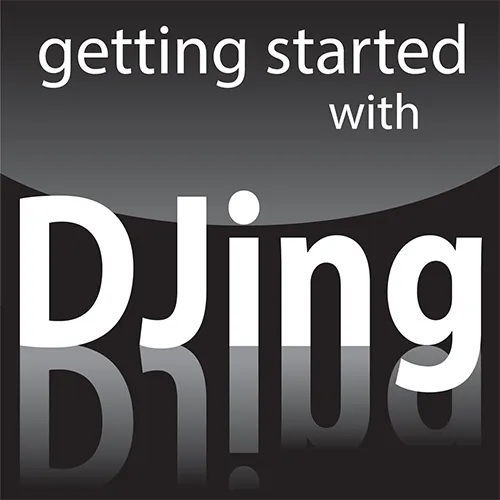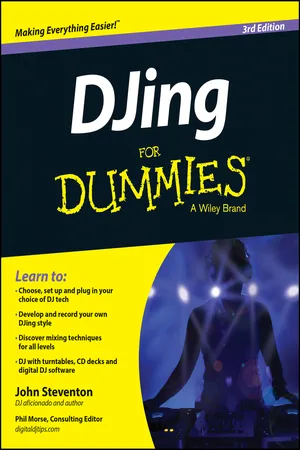DJing For Dummies
About this book
The bestselling guide to spinning and scratching is back! If you've ever spent hours in your bedroom with two turntables and an earful of tracks that sound off-beat or out of key, DJing For Dummies is the go-to guide for taking your skills to the next level. Inside, John Steventon, a successful club DJ, walks you through the basics of mixing, the techniques and tricks you need to create your own DJ style and how to make DJing work for you.
Covering both digital and old-school vinyl-based instruction, this guide covers all the latest DJ technology, equipment and software so you can get mixing and stay one step ahead of the crowd. Brimming with expert advice and easy-to-follow explanations, the information in DJing For Dummies gives you everything you need to build a foolproof set and play to a live crowd.
- Nail down the basics and build on existing skills
- Sort through the latest equipment and technology
- Have a go at crossfading, beatmatching and scratching
- Mix tracks seamlessly to sound like a pro
If you're new to the game or looking to step up your skills and graduate to club work, DJing For Dummies has you covered.
Tools to learn more effectively

Saving Books

Keyword Search

Annotating Text

Listen to it instead
Information
Getting Started with DJing

- Solve the equipment minefield using your knowledge of the hardware.
- Find out which music you want to play before you start – you need to feel passionate about whatever you choose.
- Explore your shopping options – weigh up the personal touch versus the convenience of shopping online.
Catching DJ Fever



Discovering DJing Foundations
Equipping yourself
- Input devices to play the music: You can choose from CD players, MP3 players, a computer with DJing software, or turntables that play records.
- A mixer: This box of tricks lets you change the music from one tune to the other. Different mixers offer varying control over how you can change the sound as you mix from tune to tune.
- A pair of headphones: Headphones are essential for listening to the next tune while one is already playing.
- Amplification: You have to be heard, and depending on the music you play, you have to be LOUD!
- Records/CDs/MP3s: What’s a DJ without something to play?
Making friends with your wallet
Knowing your music
Researching and discovering
- Turntables designed for DJ use need to have a strong motor, a pitch control to adjust the speed the record plays at and a good needle. They also need to have a sturdy enough construction to handle the vibrations and abuse that DJing dishes out. A home hi-fi turntable won’t do, I’m afraid. Check out Chapter 6 for more.
- Mixers ideally have three-band EQs (equalisers) for each input channel, a cross-fader, headphone cue controls and a good display to show you the level (volume) at which the music is sent out of the mixer, so you don’t blow any speakers accidentally. Chapter 10 goes into more detail on this and other functions on the mixer.
- CD decks need to be sturdy enough that they won’t skip every time the bass drum booms over the speakers. Jog wheels, easy-to-navigate time and track displays, and a pitch bend along with the pitch control are all important core features of a CD turntable. Chapter 8 is dedicated to everything CD related.
- You can use computers with DJ software in various ways, from using mouse clicks and keyboard strokes to using dedicated hardware controllers – or you can simply use your existing turntables/CD decks and a mixer to control the music on the computer. I explain all of these choices in Chapter 9.
- Headphones need to be comfortable, to sound clear when played at high volume, and to cut out a lot of external noise from the dance floor so that you don’t have to play them too loudly. Your ears are very important, so try not to have your headphones at maximum all the time. Ch...
Table of contents
- Cover
- Title Page
- Table of Contents
- Introduction
- Part I: Getting Started with DJing
- Part II: Stocking Up Your DJ Toolbox
- Part III: The Mix
- Part IV: Getting Noticed and Playing Live
- Part V: The Part of Tens
- About the Author
- Cheat Sheet
- More Dummies Products
- End User License Agreement
Frequently asked questions
- Essential is ideal for learners and professionals who enjoy exploring a wide range of subjects. Access the Essential Library with 800,000+ trusted titles and best-sellers across business, personal growth, and the humanities. Includes unlimited reading time and Standard Read Aloud voice.
- Complete: Perfect for advanced learners and researchers needing full, unrestricted access. Unlock 1.4M+ books across hundreds of subjects, including academic and specialized titles. The Complete Plan also includes advanced features like Premium Read Aloud and Research Assistant.
Please note we cannot support devices running on iOS 13 and Android 7 or earlier. Learn more about using the app



